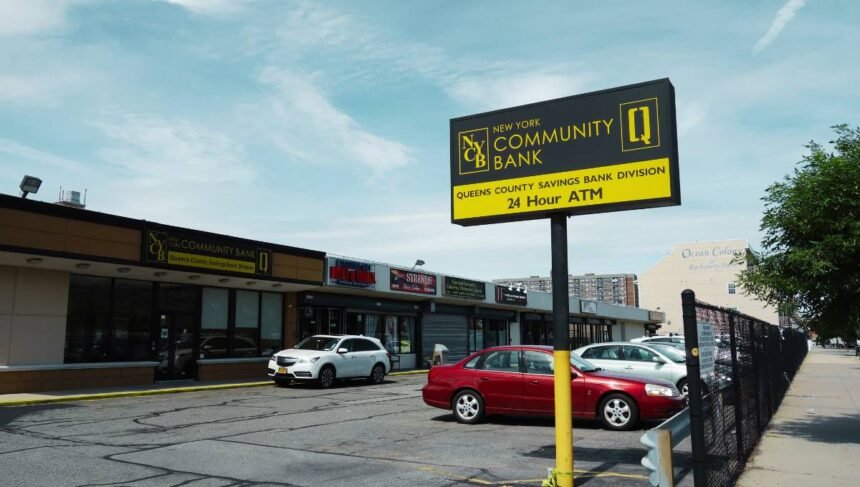New York Community Bancorp (NYCB)’s share price declined wednesday morning after Moody’s Investors Service downgraded the bank’s credit rating to the lowest level considered safe for investment.
Shares of NYCB fell nearly 14% following news of the downgrade on Tuesday night. Moody’s said the downgrade was due to various financial, risk-management and governance issues facing the bank.
The stock bounced back a bit during the day, but closed 2.5% lower as a lot of people sold regional bank stocks. NYCB shares have fallen nearly 40% in the past week alone.
Moody’s downgraded NYCB because they said the bank was focused on building its capital and had also suffered some unexpected losses on commercial real estate loans, which are a major risk for them.
NYCB made a healthy profit of $207 million in the third quarter but suffered a huge loss of $252 million in the fourth quarter. This happened because there was a big fall in share prices this week, causing big losses to regional banks. The KBW Nasdaq Regional Banking Index has fallen 12% in the past week.
During a hearing in the House Financial Services Committee on Tuesday, Representative Ritchie Torres (D-NY) asked Treasury Secretary Janet Yellen about some red flags he saw at NYCB. He noted that the bank has a massive $37 billion loan to New York City multifamily real estate.
According to Torres, if the New York Community Bank crisis goes down, it would not only mess up the banking system, but it would also mess up the largest market in apartment living in the US.
Yellen noted that the Financial Stability Oversight Council has always viewed commercial real estate as a potential risk for banks. He said loans are rising as interest rates have risen and remote work has hurt demand for office spaces.
Yellen thinks the risks are “completely manageable,” but noted that some institutions will face much greater pressure. Fed Chairman Jerome Powell reiterated the idea in a 60 Minutes interview on Sunday.
Powell noted that the Fed has looked at the balance sheets of major banks and thinks commercial real estate is not a big issue. But, there are some smaller local banks that are struggling due to their high levels of debt.
Powell noted that the Fed is collaborating with these banks to ensure they have the resources and strategies needed to deal with expected losses. He also mentioned that some banks may have to consolidate or close down due to real estate failures.
But Powell doesn’t think it’s like the 2008 crisis. “It seems like a crisis like we’ve not seen before,” he said.
Powell cautioned against making any concrete predictions, as the Fed has been cautious before. However, he believes the situation is something that regulators are keeping an eye on and dealing with, and sees it as a problem that can be handled.
NYCB Faces Financial and Governance Concerns
The NYCB has to deal not only with commercial real estate problems, but also other financial and governance issues outlined in Moody’s downgrade.
The bank has been making every effort to grow in recent years, financing rapid loan growth with expensive deposits. As a result, their net interest margins have been impacted. Furthermore, expenses are exceeding revenues, reducing their profitability.
What Moody’s is saying is that NYCB’s credit risk management is not really commensurate with the size of its loan book. The bank also does not have a Chief Risk Officer and it seems as if they do not have adequate resources for risk management.
Governance is another thing that concerns me. The NYCB is getting a lot of criticism from regulators because they don’t really have strict controls on money laundering and they are not really complying.
The bank’s board and management team have actually been there for a long time, leading some investors to wonder if there is a lack of fresh ideas and proper corporate governance.
With recent unexpected losses and an urgent need for capital, Moody’s is not very optimistic about NYCB’s ability to turn things around. But hey, the agency mentioned that the new CEO wants to tackle these problems head-on.
Markets Eye Fed Support Amid Regional Bank Stress
The NYCB faces difficulties at a time when regional banks are also grappling with economic concerns. Marketers think the Fed will probably stop raising interest rates to prevent the economy from slipping into recession.
Local banks will see a positive impact of higher rates next year. However, if the Fed decides to taper too quickly, they could take a hit to their net interest margin profits. On top of that, borrowing costs are expected to increase due to the sluggish economy.
However, Powell made it clear in his recent comments that the Fed is committed to getting prices back on track. As a result, bank stocks and the overall market witnessed a rise on Wednesday.
Investors are also thinking the Fed will probably start cutting rates in late 2023 to help the economy. By cutting these rates, the burden on bank profits will gradually reduce.
But lower rates may only provide some help to banks dealing with specific problems, like NYCB. Troubled regional banks may take years to recover through restructuring.
But it doesn’t seem like there is anything to worry about right now. Powell and Yellen rejected the idea of a commercial real estate crisis like the one in 2008.
Investors are just waiting to see what the regulators say about the situation, you know? They’re hoping for some more information about where the Fed is heading rates. Although some challenges still lie ahead, people are feeling optimistic about bank stocks reaching an inflection point.





